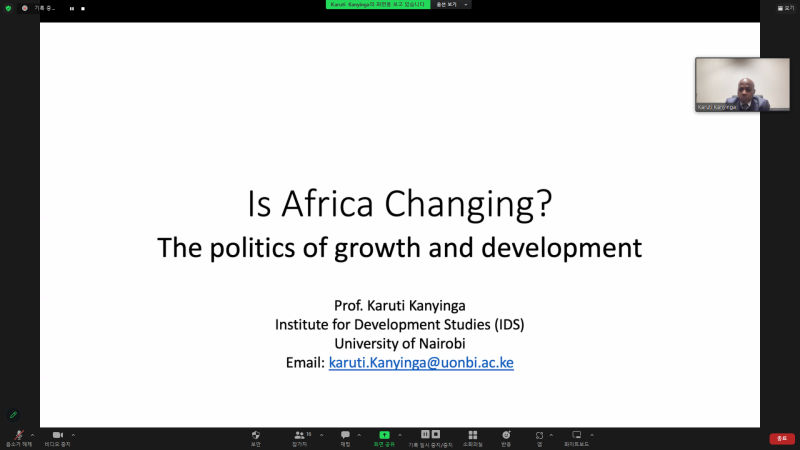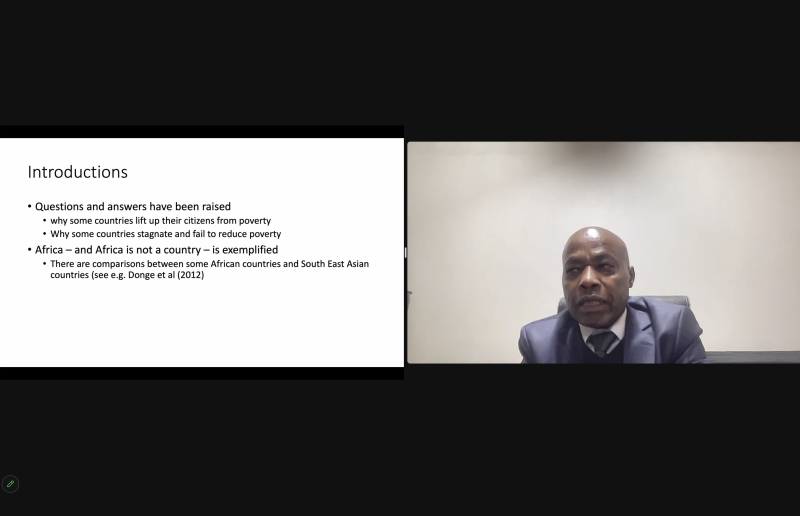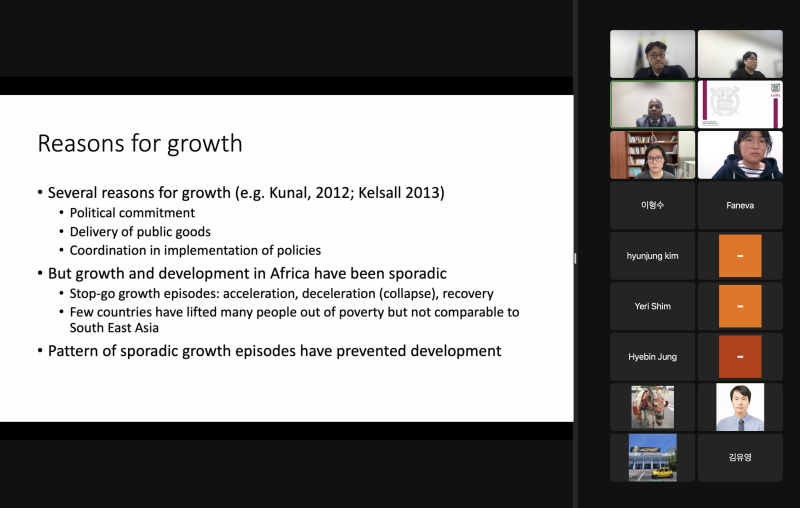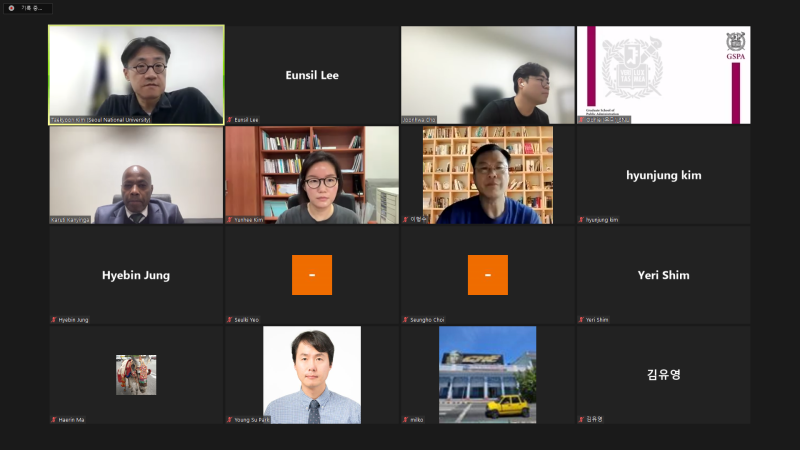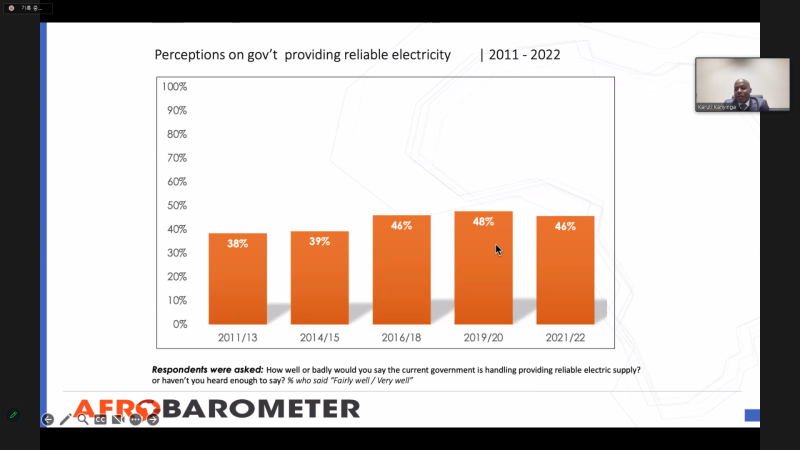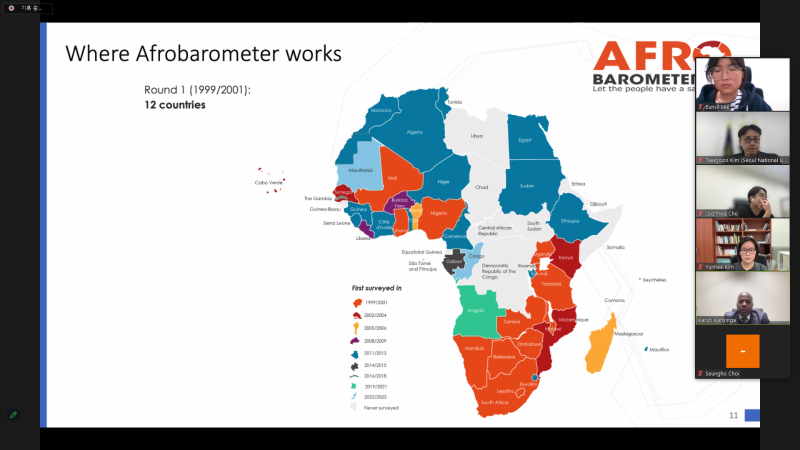행사 일정
○ 일시: 2023년 9월 26일(화), 14:00-15:30(KST)
※ 온라인(Zoom) 진행
○ 강연자: Prof. Karuti Kanyinga(케냐 나이로비 대학교)
○ 주제: Is Africa changing? The Politics of Growth and Development in Africa
행사 리뷰
서울대학교 아시아연구소 아시아-아프리카센터(센터장 김태균)는 케냐 나이로비대학교 개발학연구소 교수(Institute for Development Studies, University of Nairobi) Karuti Kanyinga를 초청하여 2023년 9월 아프리카 세미나를 진행하였다. Karuti Kanyinga 교수는 현재 나이로비대학교 개발학연구소 소장을 맡고 있으며, 과거 세계은행(World Bank)와 유엔마약범죄사무소(UNODC)에서 자문으로 활동한 바가 있다.
9월 아프리카 세미나의 주제는 [Is Africa changing? The Politics of Growth and Development in Africa]으로, 강연은 왜 어떤 국가는 시민들을 빈곤으로부터 벗어나게 하는 데 반해 어떤 국가들은 정체되고 빈곤을 퇴치하는 데 실패하는가에 관한 질문으로 시작되었다. Karuti Kanyinga 교수는 아프리카가 대표적인 예임을 강조하며, 정치적 노력, 공공재 전달, 정책 실행 협력 등 다양한 성장의 요소가 있지만, 아프리카의 성장은 때에 따라 빠르게 증가하거나, 감소하거나, 다시 회복하는 “스톱 앤 고”(Stop-go) 패턴을 보인다고 역설했다. 또한, 이러한 불규칙한 성장 패턴이 아프리카의 개발을 방해하는 요인 중 하나임을 언급하였다.
이어서 Karuti Kanyinga 교수는 아프리카의 경제적, 정치적, 사회적 문제에 대한 대중의 태도를 측정하는 범아프리카적 연구 네트워크인 아프로바로미터(Afrobarometer)의 통계 자료를 활용하여 아프리카의 불규칙한 성장 패턴에 대해 구체적으로 설명하였다. 전기, 상하수도, 보건, 교육 등에 관한 자료가 제시되었으며, Karuti Kanyinga 교수는 시민들의 성장과 개발에 관한 인식이 다양한 데이터 소스에서 얻은 결과와 일치하다는 점에 집중하였다. 통계 자료의 비교 분석 결과, 각국의 개발 경험에는 다양성이 존재하지만 대부분의 국가에서 보편적으로 시민들이 개발의 전달에 관한 불만을 품고 있는 것으로 나타났다.
마지막으로 이러한 불만의 원인을 국가와 사회 간 관계가 진화해온 역사와 1990년대부터 간헐적이고 불규칙한 양상을 보인 정치적 노력을 통해 설명하였고, 이후 40분간의 질의응답 시간을 가지며 세미나를 마무리하였다.
Event Reivew
Seoul National University Asia-Africa Center (headed by Director Kim Tae-kyun), invited Professor Karuti Kanyinga from the Institute for Development Studies at the University of Nairobi in Kenya to conduct an African seminar in September 2023. Professor Karuti Kanyinga currently serves as the Director of the Institute for Development Studies at the University of Nairobi and has previously worked as a consultant for the World Bank and the United Nations Office on Drugs and Crime (UNODC).
The theme of the September African seminar was “Is Africa changing? The Politics of Growth and Development in Africa.” The lecture began with a question about why some countries succeed in lifting their citizens out of poverty while others stagnate and fail to eradicate poverty. Professor Karuti Kanyinga emphasized Africa as a prime example and discussed various factors contributing to growth, including political commitment, delivery of public goods, and coordination in implementation of policies. He pointed out that Africa’s growth exhibits a “stop-go” pattern, characterized by rapid increases, declines, and recoveries, and identified this irregular growth pattern as one of the hindrances to Africa’s development.
Furthermore, Professor Karuti Kanyinga used statistics from Afrobarometer, a pan-African research network measuring public attitudes toward economic, political, and social issues in Africa, to provide a detailed explanation of Africa’s irregular growth patterns. Data on electricity, piped water, healthcare, and education were presented, and Professor Karuti Kanyinga highlighted the alignment of citizens’ perceptions of growth and development with results from various data sources. Comparative analysis of the statistics revealed that while there is diversity in each country’s development experiences, dissatisfaction among citizens regarding the delivery of development is a common trend across most nations.
Finally, Professor Karuti Kanyinga explained the causes of such dissatisfaction through the historical evolution of state-society relations and intermittent and irregular political commitment observed since the 1990s. The seminar concluded with a 40-minute question and answer session.
행사 사진
